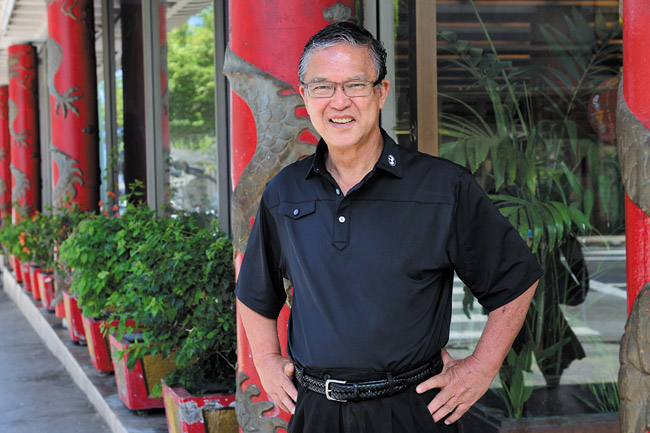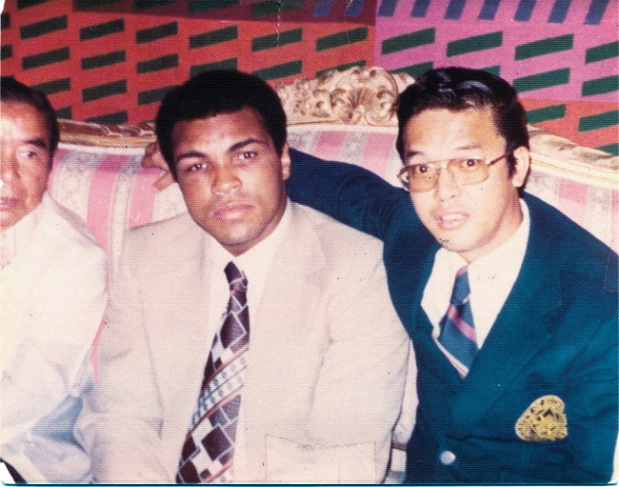Hawaii’s Version Of Forrest Gump
Like the movie character, Douglas Ho has been an up-close observer of history and famous people
Douglas Ho may in fact be Forrest Gump, or at least the inspiration for the fictional character.
Gump grew up in Greenbow, Ala., and never left his family home. Ho was born and raised in Makiki and today lives just blocks away from his old address.
mw-nm-062613-douglas-ho-2
Gump attended Alabama; Ho, Notre Dame. The two schools battled each other for the BCS Championship in January.
Both served in Vietnam, were decorated for their actions and neither seem very impressed with their actions.
Gump had a ringside seat to George Wallace’s “segregation now” speech. Ho was a guest of Muhammad Ali at the “Thrilla in Manilla.”
Gump played table tennis in front of Chairman Mao, one would assume. Ho nearly became a financial adviser for Ferdinand Marcos.
Gump made his money in shrimp and as an early investor in Apple. Ho made his fortune in precious metals and wise investing.
Gump gave money to a church and a hospital. Ho, as president of the Beatrice M. H. Young Foundation and through his own generosity, has donated millions to charities across Hawaii.
Ho looks back at his life the same way he looks in every direction, with a mixture of casual interest and humble acceptance. His office is a cluttered mess of history books, monetary guides and faded photos of a life worth documenting. He’s been asked, but is not interested.
“I don’t care about any of that stuff,” he says with a characteristic shrug of his shoulders. “I’m an observer of history, not a part of history.”
Before going to New York to work as a portfolio manager and analyst in precious metals for Walston and Co., Ho was a Maryknoll graduate who joined Notre Dame’s ROTC program and was then sent to Vietnam after finishing up his MBA at UH. Because of the carnage of war, Ho moved up quickly in rank and soon became the captain of an artillery unit attached to Army and Marine Corps units in areas that became synonymous with the war – Khe Sanh and Hamburger Hill.
“Sometimes I had to go out into the damn jungles, too. That was a crazy, stupid place. They shot at us, we shot at them. I lost two friends. I lost more than that. I lost my neighbor, this pure Hawaiian boy. I lost my best friend over there, Dave Sullivan. He played linebacker at Notre Dame. He got hit the first week, he was gone.”
For his service, Ho received the Bronze Star and Army Commendation Medal.
“I didn’t do anything there,” he says in the modest tone of most veterans of violent conflicts. “I lost the medals and have no interest in getting another one. I don’t need it.”
Ho’s service wasn’t just hard on him physically. There was the emotional turmoil, as expressed by Ali, whom Ho calls a “quiet, humble and very nice man.” While the heavyweight champ was a true critic of the war, he never let the issue drive a wedge between himself and those he cared about. His friendship with Ho lasted for decades, with the Oahu native frequently invited to his fights.
“Ali was really disappointed when I went to Vietnam. He told me I was going over there to kill my brothers. I thought about that. ‘Am I going there to kill my brothers?'”
Ho’s association with the boxing champ and cultural icon began a few years after his sister Annie married Dr. Charles Williams. A prominent physician in Chicago’s black community, Williams counted Nation of Islam founder Elijah Muhammad and Malcom X as his patients. When Ali switched to Islam, Williams became his doctor as well. And even though those were contentious times racially in the country and in Hawaii – Ho’s family disowned his sister for a number of years – he said he was never treated as an outsider by the mostly African-American crowd he was hanging out with.
“I was welcomed with open arms. I was welcomed as someone unique. I wasn’t white and I wasn’t black. It’s like my cousin Don Ho said, I was beige,” he says with a laugh.
After surviving the war and a sniper’s bullet that missed his head by inches, Ho came to value whatever time he had left. So he traveled, taught, did business and just enjoyed a lifestyle high on adventure and low on future concerns.
“I was just having too good of a time. I was traveling from Hong Kong to Taiwan to Singapore. I was just relaxing after the war. I figured I almost got knocked off in Vietnam, I’m going to enjoy life.”
He did, and he has.
Ho continues with his childhood hobby of coin dealing, because it’s fun and he enjoys the historical significance and future potential of it. He owns a modeling agency in Chongqing, China, because, well, who wouldn’t want to be surrounded by 200 stunning young women? He sure seems to know what he’s doing in the beauty industry. He sponsored Crystal Lee in her successful run at winning Miss Hawaii 2013. Now, in one of his latest endeavors, he’s turned his boyhood interest in World War II pilots to helping preserve the history of the famed Flying Tigers fighter squadron that was made up of U.S. and Chinese pilots.
Ho met Long Qingming when the aged Flying Tigers veteran entered Ho’s Chongqing restaurant. Ho befriended Qingming and eventually sat down with him for an interview about his experience flying with Americans against Japanese targets. It is this interview that is the basis of an upcoming book about the Flying Tigers.
Ho doesn’t know where his name will appear in the book being written by a professor in China. Typically, he doesn’t care.
“I’m just trying to spread the word,” he says. “These were Americans who fought with Chinese, so you should be proud to be both Chinese and American. Those guys were real heroes.”
Last week, Ho was the keynote speaker at the Chinese Chamber of Commerce luncheon celebrating the publication of the group’s official history. The chamber took a year to celebrate its 100-year history and counted on a number of donors to make it possible. Ho kicked in $40,000.
“He has helped me out quite a bit for our centennial celebration. I was searching for a centennial sponsor and Doug filled that role,” said chamber president emeritus Vernon Chang. “With his monetary support, it allowed us to go ahead with these events, and he is part of other contributors who combined to make the event a tremendous success.”
It’s what a real-life Forrest Gump would do.







